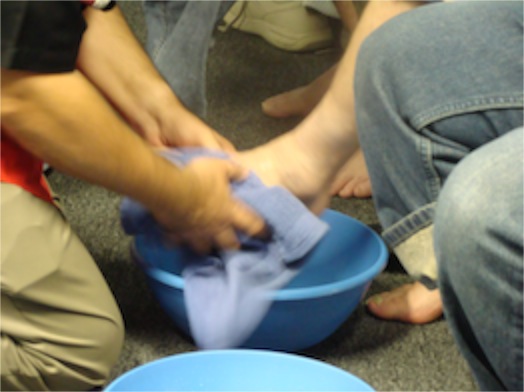Maundy Thursday, 2013
28/03/13 03:32

We’re not really big on footwashing in our culture. We tend to think of our feet as something smelly, something that might be best left covered up. A number of years ago as we prepared for a Maundy Thursday pageant a member of my congregation commented that he would be leaving his shoes on during that part of the pageant: “I don’t take my shoes of in public and I’m not going to start doing to today.” But imagine, if you will how much more clean our feet must be than those of everyday people in the time of Jesus who wore not shoes, or if they were lucky they had sandals. Their feet must have been constantly dirty from walking the trails and unimproved roadways. They must have been as sweaty as ours and covered with sores and corns and bunions and other things we don’t talk about in polite company. It was feet such as these that Jesus washed. Peter didn’t like the idea and tried to talk Jesus out of it. But Jesus wouldn’t let him. He got down on his knees in the dust and dirt and scabs and scales of real humanity and served the people that he loved.
More than a few would like to ignore this instruction. They worry about infection and sharing problems and fungi. So when we wash feet this evening in our church we’ll be doing so in a most antiseptic manner with pre-heated disposable wipes and very clean conditions. We are more afraid of infection than we are of the consequences of being half-hearted disciples who take some, but not all of the instructions of Jesus seriously.
But I have witnessed moments of sacred footwashing. Some have even occurred in churches. A couple of times each month there is a sacred circle for footwashing at the Canyon Lake Senior Citizens’ Center. The foot clinics are attended by home health care nurses who bathe the feet and trim the toe nails of those who are aged and unable to care properly for their own feet. Foot care is especially important for those who are diabetic and each time the clinic is open the folks gather around and patiently wait for the few minutes when they will be seated in a comfortable chair without shoes or socks and have their feet gently bathed in warm water. The nurses kneel at the feet of those being served, or sit on very low stools. The tone is quiet, but friendly with warm conversation all around. It is a sacred moment.
And today is the day we remember the mandate of Jesus that we attend to each others’ needs.
There is another possible source for the term Maundy. The Latin mendicare, Old French mendier, and English maund all mean “to beg.” The noun form of the word refers to a small basket held out by maunders (beggers) as they maunded (begged) in public places.
Today isn’t a bad day to remember those who are reduced to begging in a society that takes a dim view of such activity. People ask me for money from time to time. Some ask because they think that the church is in the business of giving charity. While we do support a number of outreach missions and we are engaged in seeking to end hunger and poverty, we don’t have a fund dedicated to giving money to those in need. Some ask because they’ve heard that I do what I can to help. I’ve been known to give away some of my money when it seems the need cannot be otherwise met or the story strikes my heart. Some ask because they are desperate and there isn’t any place else that they can think of to turn. There are lots of requests that we cannot meet. While an occasional tank of gas does get given, we aren’t rich enough to give away “free gasoline.” Paying rent or utility bills is also beyond our means. Those who ask sometimes go away empty-handed and more often go away with much less help than they had hoped for.
While the Gospels give a general sense that we are called to help the poor and be generous with the abundance we have received, it isn’t much help in determining the response to any specific need. In Matthew 26:11 we are reminded that we do not have the means to end poverty. But that verse comes just a chapter after the powerful testimony of Matthew 25:31-46 that “whatever you did unto the least of these brothers and sisters you did unto me.”
When I lead worship I put a stole around my shoulders. It is a piece of liturgical clothing that is a reminder of the towel that Jesus took up when he washed the feet of the disciples. For a minister it is supposed to be a reminder that we are not ordained to rule over others, but rather we are ordained to serve. It is a simple way of keeping our minds on the fact that the Mandatum is not reserved for Maundy Thursday, but is an invitation for everyday living.
Today is Maundy Thursday. May it be a reminder of the call to live a life of service to others not just one day of the year, but every day.